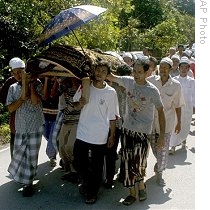Bangkok
25 June 2009
Thailand is struggling to end a Muslim insurgency in the south that since 2004 has claimed more than 3,400 lives. The Thai government plans to tackle the violence with more security and development assistance. But, political analysts say the focus should be on resolving long-standing grievances of ethnic Malay Muslims.
Shootings, bombings, and beheadings in southern Thailand are so common they rarely make front-page news.
 |
| Thai-Muslim villagers carry body of victim of attack to a cemetery in Joh-I-Rong district of Narathiwat province, 09 Jun 2009 |
Thai authorities say masked insurgents shot dead 11 worshipers in an effort to drive a wedge between the south's Malay Muslims and Thai Buddhists.
Muslims accuse Thai security forces of being behind the shooting.
The suspicions and revenge killing that followed have underscored a dark divide in the south.
A researcher for Human Rights Watch in Thailand, Sunai Phasuk, says the mosque attack fits a pattern of retaliation by rogue elements within Thai security forces.
"The shooting in Narathiwat was not the first attack of [a] Muslim mosque. There have been at least 10 well-documented cases like that,"said Sunai. "But, since 2004 up until now, none of those cases have been properly investigated by the Thai authorities, no arrest warrants have been issued and the gunmen, the perpetrators in those shootings, are still at large and they are making, they are committing, he same crimes again and again."
A 2005 emergency decree gives Thai security forces immunity from prosecution and the authority to detain suspects for up to a month without charges.
Rights groups say security personnel have abused the powers and used torture and extrajudicial killings in their efforts to stamp out southern insurgents. They say the abuses have only encouraged the southern rebellion and alienated locals.
Thai authorities deny the accusations.
"We are confident that our personnel, military personnel in the south have been sacrificed for our duty, and make sure that [the people are confident] that we will do all the best to secure safety for the people," said Colonel Parinya Chaidilok, a Thai military spokesman.
There are more than 40,000 military, police, and civilian defense volunteers in the south. The government says it is adding several thousand more to try to control the violence.
The government also plans large investments in development projects in the south as part of a campaign to win the hearts and minds of locals.
Thai government spokesman Panitan Wattanayagorn says the spike in attacks is not a trend, but may be an insurgent response to successful security operations and better Muslim-Buddhist cooperation.
"The overall statistics for this year suggest a different trend. Almost 50 percent of the incidents have been decreased," said Panitan. "Almost 35 percent of the deaths have been reduced. That is the statistics that accepted by most agencies - public and private. But, of course, in the isolated areas there have been an increase in terms of violent crimes against certain communities."
Most attacks in the south are thought be committed by ethnic Malay Muslims who want to separate the region from Thailand, which is predominately Buddhist.
In the early 1900s, Thailand seized control of the Malay sultanate territory now known as Narathiwat, Pattani, and Yala provinces.
The Muslim Malay population, which dominates in the region has often bristled under Thai control, and tensions occasionally erupt into violent resistance.
Marc Askew, a senior research fellow in the center for conflict studies and cultural diversity at the Prince of Songkla University in Pattani, says Thailand's Muslim insurgents have been influenced by global Islamic movements.
"We had Mujahideen fighters coming back from Afghanistan, for example, you have had increase in politicized Islam in Indonesia where large numbers of students from the three provinces went to study," he said. "You had the emergence of a more uncompromising, strict Islam coming through as a more of a global trend."
Political analysts say Thailand's southern insurgents are not directly linked to international terrorist groups, but have borrowed some of their tactics - such as beheading victims. They target teachers, farmers, monks, and Muslims suspected of cooperating with authorities.
A report this week by the International Crisis Group says some teachers at Islamic schools are using the rhetoric of global jihad - Muslim holy war - to recruit insurgents.
But the ICG's Thailand analyst, Rungrawee Chalermsripinyorat, says many at the schools are not aware of the recruitment activities.
"What we propose is not to try to crack down on these activities or try to close down these Islamic schools because it will only create further anger among the Malay Muslims. he government should address the grievances of Malay Muslims recognize their distinct identity as a Malay Muslim," said Rungrawee.
Rungrawee says attempts to inspire Thai nationalism in Malay Muslims have resulted in a disregard for their ethnic identity and language. He says Malay Muslims are also underrepresented in southern politics and government jobs.
Rungrawee says for a lasting peace to take hold the government must correct these imbalances or risk encouraging a steady flow of insurgent recruits.